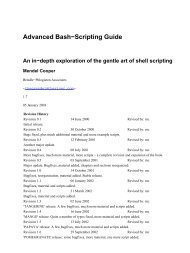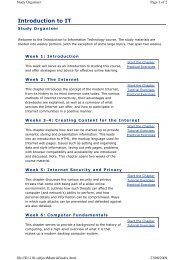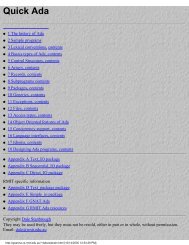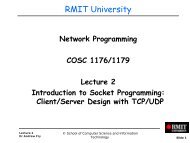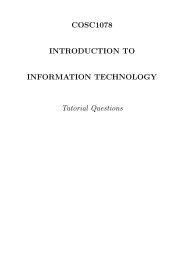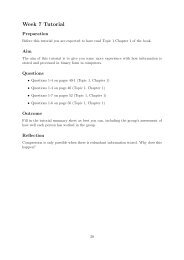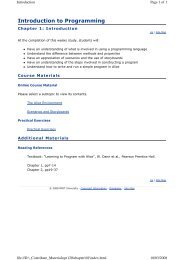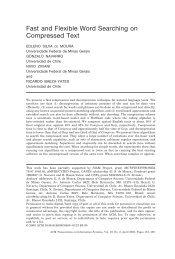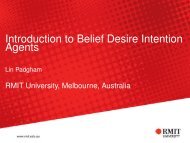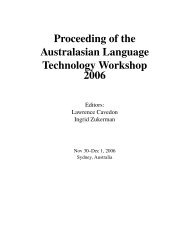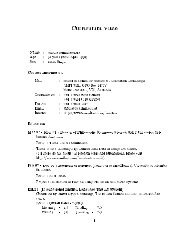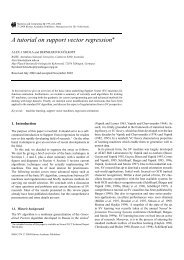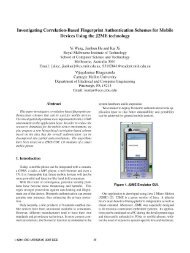The MBC information booklet - RMIT University
The MBC information booklet - RMIT University
The MBC information booklet - RMIT University
Create successful ePaper yourself
Turn your PDF publications into a flip-book with our unique Google optimized e-Paper software.
3.2.3 ISYS1072—<br />
Deductive and<br />
Object-<br />
Relational<br />
Databases<br />
Chapter 3: Advanced Databases<br />
• Co-requisite: Extensive programming skills in C language and advanced data<br />
structures and algorithms, equivalent to COSC1285 Advanced Programming<br />
Techniques<br />
For more <strong>information</strong> on the course, go to www.rmit.edu.au/courses2006/029570.<br />
Note: This is a Masters-level course.<br />
Aim<br />
This course has two components. In the first component students are introduced to<br />
extensions to the traditional relational data model, known as Deductive Databases.<br />
Students will study those elements of Logic Programming, which are directly linked to<br />
Database Systems, and will learn optimisation techniques for deductive databases, how<br />
to use a Database with deductive capabilities based on SQL 3.<br />
In the second component the course will cover the principles and use of object relational<br />
database systems. This covers the transformation methodology of object to tables,<br />
object-extension in relational systems, and object-oriented concepts and<br />
implementations in object-oriented database systems.<br />
Students who complete the course will be familiar with using an object-relational<br />
database system, be able to design using an object model and transform it to relational<br />
tables, and understand in broad terms the concepts of object-relational and objectoriented<br />
database systems.<br />
Objectives<br />
At the conclusion of the course, the student should be:<br />
• able to understand the need for Deductive Databases;<br />
• able to understand the optimisation issues surrounding deductive queries;<br />
• able to understand how to create and use a Deductive Database;<br />
• able to understand the principles underlying relational, object-relational and objectoriented<br />
database systems and their applications;<br />
• able to understand the transformation issues from an object model to a relational<br />
model;<br />
• familiar with object extensions in commercial database systems;<br />
• familiar with the current development of SQL involving object-oriented features.<br />
Prerequisites<br />
• ISYS1055 Introduction to Database Systems<br />
• Co-requisite: COSC1295 Java for Programmers OR COSC1252 Object-Oriented<br />
Programming<br />
Syllabus<br />
• Introduction to Deductive Databases and Logic Programming; Viability of Logic<br />
Programming Approach<br />
• Optimisation for Coupled Systems<br />
• Datalog and Model <strong>The</strong>ory<br />
• Relational Translation and Differential Optimisation<br />
• Negation<br />
• Magic Sets<br />
• Introduction to Object Oriented Modelling with UML; Applications of Relational,<br />
Object-Relational and Object-Oriented databases<br />
• Object-Relational Transformation (Inheritance and Association)<br />
• Object-Relational Transformation (Aggregation and Object behaviour)<br />
• Object-Relational Databases<br />
• Object-Oriented Databases<br />
19



